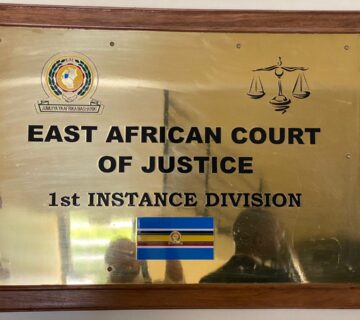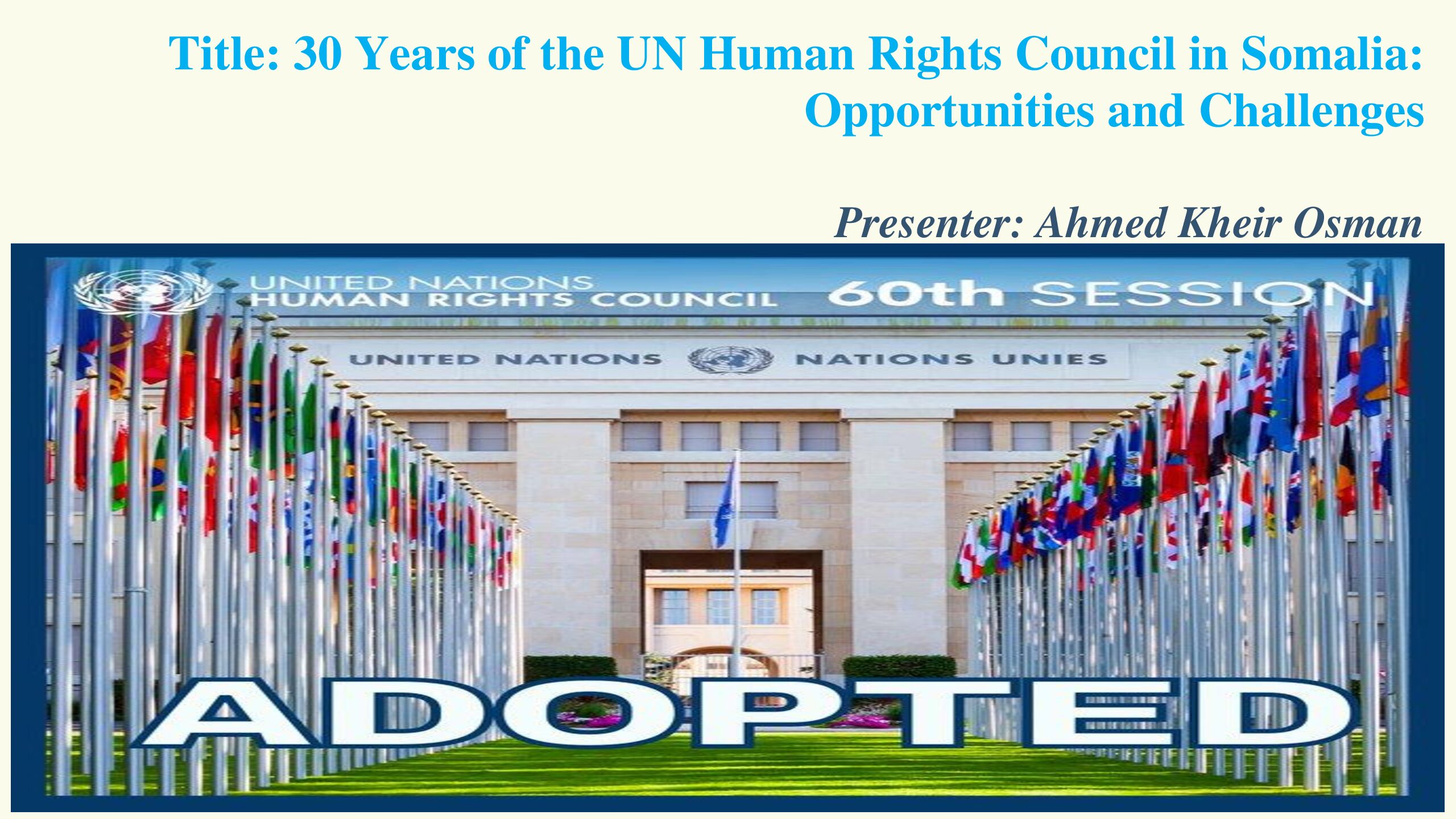Introduction
Convincing the Community, the region, and the Court that Somalia applied the 4.5 clan-based formula means first recognizing the core contradiction within the system. The formula operates on unequal political participation, because it assigns representation according to clan affiliation rather than treating citizens as individual political actors with equal rights. [1]
This inherent inequality makes the formula fundamentally incompatible with the spirit of Article 50 of the EAC Treaty, which requires Partner States to elect EALA members through processes that “represent as much as is feasible” the political, gender, and social diversity within each State. Because 4.5 distributes political influence collectively rather than individually, it inevitably produces imbalances that fall short of the inclusive, competitive, and representative standards demanded by Article 50.
EACJ jurisprudence reinforces this interpretation. In Anyang’ Nyong’o v Attorney General of Kenya (2006), the Court held that Partner States must strictly respect Article 50 criteria and cannot rely on domestic political compromises that undermine democratic obligations. Similarly, in Katuntu v Attorney General of Uganda (2012), the Court held that EALA elections must be grounded in regional Treaty obligations rather than internal political practices. Together, these cases confirm that national mechanisms cannot override Article 50 unless they form part of a region-wide practice.
Considering that national, regional, and international courts are obligated to settle conflicts using recognized substantive and procedural frameworks, it is evident that the EACJ cannot raise an unrecorded political agreement to the status of a mandatory legal norm. Without constitutional or statutory grounding, the 4.5 arrangement remains outside the formal legal system.
The Court would therefore be justified in declaring that 4.5 cannot serve as a normative basis for EALA elections unless the Court is prepared to rely on customary organizational norms something it has never recognized in this context. Endorsing 4.5 would mark the first instance where the EACJ validates a purely customary domestic arrangement as a source of electoral legitimacy, thereby extending its jurisprudence into uncharted institutional territory.
International and institutional custom cannot be manufactured by the practice of a single State. In Asylum, the ICJ held that a party invoking a regional custom must prove “constant and uniform usage practiced by the States in question”, not just its own behavior.[2] Hence, a unilateral Somali practice (4.5 formula) cannot bind other EAC Partner States, and cannot become a regional/institutional custom of the Community.
In Right of Passage over Indian Territory, the Court held that a local custom can exist between two States only when both consistently follow and accept the practice as legally binding. One State’s conduct alone cannot create custom.[3] Within the framework of the EAC region, Somalia’s application of the 4.5 formula, which is neither recognized nor endorsed by Kenya, Uganda, Tanzania, or any other Partner State, cannot be deemed an “institutional custom” of the EAC. Additionally, it cannot affect the consistent regional standard established by Article 50 of the EAC Treaty.[4]
The 4.5 formula also conflicts with Somalia’s Constitution, particularly Article 11, which guarantees equality before the law and prohibits discrimination. By allocating representation according to clan identity, the system violates this principle and contradicts the six core international human-rights treaties to which Somalia is a State Party, all of which enshrine equality and non-discrimination as binding obligations.[5]
Representativeness and the 4.5 Formula (Paragraph 50–51): The Court observed at parag. 50 that although the Respondent State asserted that its list of nine nominees complied with the 4.5 distribution model rooted in the Garowe Principles, the purported balance was superficial. Despite presenting clan proportionality, the list was disproportionately dominated by individuals aligned with the JSP political faction, undermining the intended diversity the 4.5 model seeks to guarantee in Somalia’s fragile political context.
The Applicants argued at paragraph 51 that, the handpicking process disregarded Parliament’s inherent 4.5-based diversity and excluded voices aligned with emerging or informal opposition. Although the Respondent claimed Somalia has no “formal opposition,” the Court emphasized that the absence of registered political parties does not negate constitutional expectations of representation, pluralism, and inclusivity. Thus, even on Somalia’s own terms, the claimed application of 4.5 was inconsistent and unrepresentative.
In paragraph 53, the Court found that the Somali process lacked transparency and failed to ensure genuine competition. These procedural deficiencies raised substantial legal concerns that warranted judicial scrutiny. Consequently, in parag.54, the Court affirmed that the Applicants’ claims were neither frivolous nor vexatious, justifying a full hearing on the merits.
Irreparable Harm and Institutional Damage: At parag. 59, the Court held that monetary remedies could not compensate Applicants for the loss of a lawful, treaty-compliant election opportunity. This form of political deprivation cannot be repaired financially. The Court further found in paragraph 61 that improperly seating nominees would inflict immeasurable damage on the legitimacy of EALA and undermine broader regional integration efforts. Finally, the Court concluded at paragraph 62 that irreparable harm would occur if the nominees were sworn in, making interim measures essential to preserve the status quo and prevent irreversible institutional consequences.
Conclusion and Recommendations
The EACJ’s interim ruling underscores the incompatibility between Somalia’s 4.5 clan-based formula and the regional standards required under Article 50 of the EAC Treaty. While 4.5 may function domestically as a temporary political arrangement, it lacks constitutional and statutory legitimacy and cannot override the Treaty’s demands for transparent, inclusive, and representative elections.
The Court’s reasoning supported by regional jurisprudence and international custom confirms that a unilateral domestic practice cannot become a binding regional norm. The finding of irreparable harm further demonstrates that seating unlawfully selected members would permanently damage the legitimacy of EALA and the integrity of the regional system. The interim order was therefore essential to preserve the Treaty framework and ensure that EALA elections remain grounded in regional legal obligations rather than informal national compromises.
To prevent similar disputes, enhance transparency, and strengthen the democratic legitimacy of the East African Legislative Assembly, several steps should be taken at the institutional and legislative level:-
First, the East African Legislative Assembly should adopt a specific legal framework governing the implementation of Article 50, including detailed procedures on nomination, vetting, voting, public participation, inclusivity, and dispute-resolution mechanisms. The absence of uniform election procedures across Partner States creates uncertainty, invites political manipulation, and places excessive interpretive burden on the Court. A comprehensive EALA Election Act or an Annex to the Treaty would provide clarity, predictability, and legal coherence.
Second, the EAC should develop a harmonized standard for assessing representativeness, consistent with the Treaty’s requirements for political diversity, gender balance, and social inclusivity. Such standards would prevent reliance on informal or extra-legal mechanisms such as Somalia’s 4.5 model that are inconsistent with constitutional principles and incompatible with regional obligations.
Third, Partner States should be required to codify their national procedures for nominating and electing EALA members. Clear domestic legislation would reduce arbitrary practices, strengthen accountability, and provide both the Court and the Community with a measurable standard for compliance.
Finally, the Secretariat and the Council of Ministers should consider issuing uniform guidelines on EALA nomination timelines, publication of candidates, public objections, and parliamentary oversight. This would reinforce democratic participation and reduce the risk of disputes escalating to judicial intervention.
Through these measures, the EAC can fortify its institutional architecture, safeguard the representative character of EALA, and ensure that Article 50 operates as an effective and enforceable pillar of regional democratic governance.
[1] Hashi et al, ‘Beyond the 4.5 Clan Quotas: Evaluating the Feasibility of a Merit-based and Inclusive Federal Power-sharing odel in Somalia’ (2025), Cogent Social Sciences, 11(1), available electronically at https://www.tandfonline.com/doi/full/10.1080/23311886.2025.2544066#abstract. Accessed 23/11/2025
[2] International Court of Justice. (1950). Asylum (Colombia v. Peru), Judgment of 20 November 1950, ICJ Reports 266. ‘…. the party relying on such a custom must prove it is established so as to be binding on the other party, and that the rule is in accordance with constant and uniform usage practised by the States in question.’’
[3] Right of Passage over Indian Territory (Portugal v India) (Merits) [1960] ICJ Rep 6 at https://www.jku.at/fileadmin/gruppen/154/Leading_cases/RightofPassageoverIndianTerritory_ger.pdf?utm_source=chatgpt.com.
[4] European Communities- Customs Classification of Certain Computer Equipment, Appellate Body Report, WT/DS62/AB/R, WT/DS67/AB/R, WT/DS68/AB/R (22 June 1998). ‘’…. the purpose of treaty interpretation is to establish the common intention of the parties. To establish this intention, the prior practice of only one of the parties may be relevant, but it is clearly of more limited value than the practice of all parties.’’ Available at https://www.wto.org/english/tratop_e/dispu_e/repertory_e/t1_e.htm?utm_source=chatgpt.com.
[5] Ahmed kheir Osman ‘Imposing Written Exams for Somalia’s Human Rights Commission: What justifies this Method? (2025), SIDRA Policy Brief, available at https://sidrainstitute.org/imposing-written-exams-for-somalias-human-rights-commission-what-justifies-this-method/.






No comment